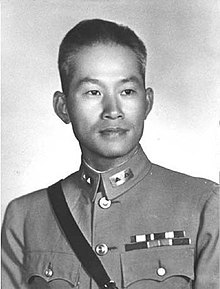
Back سون لي چين ARZ Li-jen Sun Spanish Sun Li-jen French Sun Li-jen ID Sun Li-jen Italian 孫立人 Japanese 쑨리런 Korean Sun Liren Polish Сунь Лижэнь Russian Sun Li-jen Swedish
Sun Li-jen | |
|---|---|
| 孫立人 | |
 Sun Li-jen | |
| Commander of the Republic of China Army | |
| In office March 1950 – June 1954 | |
| Preceded by | Gu Zhutong |
| Succeeded by | Huang Chieh |
| Personal details | |
| Born | December 8, 1900 Jinnu, Lujiang, Chaohu, Anhui |
| Died | November 19, 1990 (aged 89) Taichung, Taiwan, Republic of China |
| Alma mater | Virginia Military Institute |
| Awards |
|
| Nickname | "Rommel of the East" |
| Military service | |
| Allegiance | |
| Branch/service | |
| Years of service | 1927–1955 |
| Rank | |
| Commands | Tax Police Regiment New 38th Division New First Army Republic of China Army |
| Battles/wars | |
Sun Li-jen (traditional Chinese: 孫立人; simplified Chinese: 孙立人; pinyin: Sūn Lìrén; December 8, 1900 – November 19, 1990[citation needed]) was a Chinese Nationalist (KMT) general, a graduate of Virginia Military Institute in the United States, best known for his leadership in the Second Sino-Japanese War and the Chinese Civil War. His military achievements earned him the laudatory nickname "Rommel of the East".[1] His New First Army was known as the "Best Army under heaven" and credited with effectively confronting Japanese troops in the 1937 Battle of Shanghai and in the Burma Campaign, 1943–1944.
Perhaps because of his foreign military training, he did not have the full confidence of Chiang Kai-shek. Sun was relieved of battle command in the Chinese Civil War in 1946, and although he was made Commander in Chief in 1950 after the retreat of the Nationalist central government to Taiwan, he was given only ceremonial roles. He was charged with conspiracy in 1955 and spent his last thirty years under virtual house arrest.
He was also known as Sun Chung-neng (孫仲能, Sūn Zhòngnéng; "Chung-neng" being his art name) and had the courtesy name Fu-min (撫民, Fǔmín).
- ^ "2016-2017 - News - Virginia Military Institute". www.vmi.edu. Archived from the original on June 1, 2023. Retrieved January 4, 2024.
© MMXXIII Rich X Search. We shall prevail. All rights reserved. Rich X Search